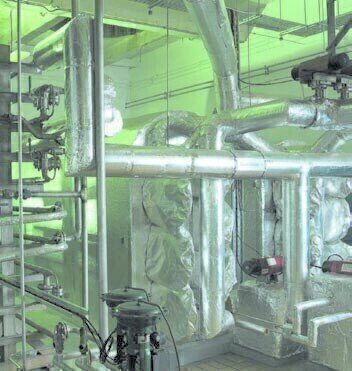News
Partnership could mark adoption of supercritical oxidation process
Feb 04 2011
Rockwell Automation and Ireland-based SCFI Ltd have entered a strategic partnership that could see the start of a dramatic change in the way water and waste water sludge is dealt with – by using a Super Critical Water Oxidation’ process that results in almost 100% solubility for gases and organic compounds. The companies expect the first commercial unit to be fully operational in the autumn of 2011.
The units raise the temperature of the water/sludge to 374oC and pressurising it to 221 bar to bring about a supercritical condition or ‘fourth phase’, resulting in the solubility of gases and organic compounds being increased to almost 100%, while inorganic compounds become largely insoluble. Wet Air Oxidation processes typically achieve only partial oxidation of pharmaceutical wastewater, whereas in the Super Critical phase, complete oxidation is achieved without the air emissions issues which are associated with incineration of high strength organic wastewater streams, said a spokesperson.
Vincent Guillaumie, Rockwell Automation’s water and waste water industry business manager in EMEA, said: “Our partnership with SCFI demonstrates Rockwell Automation’s commitment to working with partners at the cutting edge of new technologies. This technology is particularly timely as it can replace expensive and wasteful practices for disposing of wastewater that cannot be treated in a traditional way under tight EU regulations.” The company are active in the pharmaceutical market and also offers solvent recovery solutions for wastewater of this type.
The Rockwell Automation control platform, all mechanical and electrical components, instruments and controls in each unit are built in Cork, Ireland and are easily transportable. “Involving a global company with the infrastructure of Rockwell Automation has distinct advantages for the product to impact on local markets worldwide,” said SCFI’s Chief Operating Officer, David Kerr.
The process is carbon neutral and provides return on investment by eliminating the costs of disposal with a standard sized unit estimated to be able to return the outlay investment in five to six years. “The reduced carbon emissions compared to incineration or transport for landfill could prove to be very important for water companies seeking to comply with the Europe’s strict Carbon Reduction Commitments,” added Vincent Guillaumie.
Digital Edition
Lab Asia Dec 2025
December 2025
Chromatography Articles- Cutting-edge sample preparation tools help laboratories to stay ahead of the curveMass Spectrometry & Spectroscopy Articles- Unlocking the complexity of metabolomics: Pushi...
View all digital editions
Events
Jan 21 2026 Tokyo, Japan
Jan 28 2026 Tokyo, Japan
Jan 29 2026 New Delhi, India
Feb 07 2026 Boston, MA, USA
Asia Pharma Expo/Asia Lab Expo
Feb 12 2026 Dhaka, Bangladesh



















